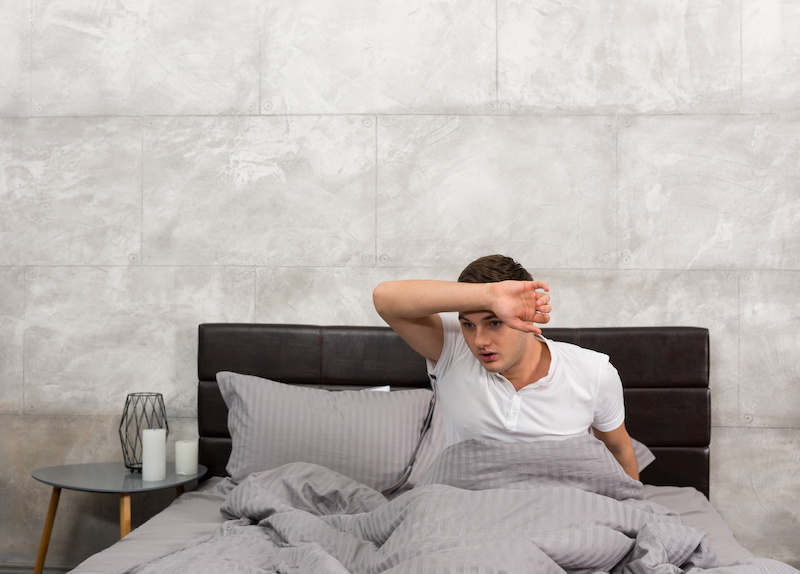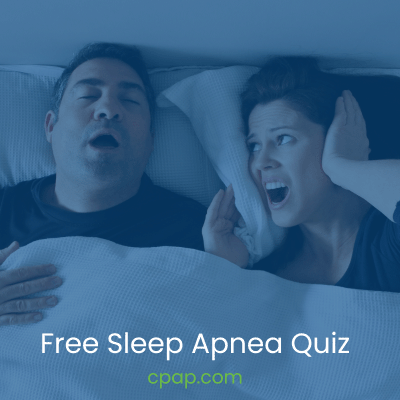
If you’ve ever woken up drenched in sweat, you know how uncomfortable it feels. You may feel like you can’t talk to anybody about it and may be anxious about why it keeps happening. Don’t worry. You aren’t alone, and it can be easier than you thought to get to the bottom of your problem.
Does sleep apnea cause night sweats? There is definitely a strong connection, but there are successful treatment options, like using a CPAP machine.
If you experience frequent night sweats, it could be a sign of untreated sleep apnea. Read on as we break down what night sweats are and whether or not they’re an outcome of having untreated sleep apnea.
What Are Night Sweats?
Night sweats are what happens when you experience extreme perspiration while you sleep. If it happens on occasion, you don’t have much to worry about. You could have been under too many blankets, or your bedroom could be too warm. The last thing you ate before bed can even cause some sweating, so in many cases, there is nothing to fear.
However, if it happens on a consistent basis, and you regularly wake up after sweating through your clothes and onto your sheets, it could be a medical issue that needs to be addressed.
There are multiples things that could cause consistent night sweats, like menopause and other hormonal imbalances, stress and anxiety, an autoimmune disease, certain medications, and other issues. There is also a strong connection between untreated sleep apnea and night sweats.
Does Sleep Apnea Cause Night Sweats?
Sleep apnea is when your breathing is affected while you sleep. You may completely stop breathing over the course of your sleep cycle. The experience raises your cortisol levels, the stress hormone and can give you the sensation of working out while you sleep as your body tries to get back to breathing regularly.
This Icelandic sleep apnea study shows that people with untreated sleep apnea experienced night sweats 30% more than those without sleep apnea. Why is this occurring? According to this study, higher blood pressure and a lower rapid eye movement sleep percentage could be the cause.
If you’re experiencing regular night sweats, it could be a symptom of untreated sleep apnea. Other signs of sleep apnea include:
- Snoring
- Regular Headaches
- Daytime Sleepiness
- Trouble Concentrating
- Irritability
- Regular Sore Throat or Dry Mouth
- Memory Loss
If you deal with any of these signs on a consistent basis, along with regular night sweats, you should consult your doctor about sleep apnea. They may recommend a CPAP machine to help get it under control.
Sleep Apnea Cold Sweats
Another symptom of untreated sleep apnea can be cold sweats. Cold sweats are different from night sweats as they aren’t constrained to only happening while you sleep.
The most common reason a cold sweat occurs is from stress. A cold sweat usually occurs as part of your body’s fight or flight response. Since sleep apnea puts your body in distress, you could experience cold sweats while having an apnea event. However, night sweats are a much more common symptom of sleep apnea.
Think You May Have Sleep Apnea? Take Our FREE Sleep Apnea Quiz!
Treatment for Sleep Apnea: CPAP Machines
CPAP machines are the most recommended treatment for sleep apnea, as they provide a steady stream of oxygen to your mouth and/or nose that helps your airway stay open while you sleep.
When you’re using a CPAP machine to help reduce the symptoms of your sleep apnea, you should see a drastic decrease in night sweats. In fact, one Japanese study found that the use of a CPAP machine completely eliminated sleep apnea-related night sweats.
CPAP therapy typically works extremely quickly and effectively, but it may take time to get used to sleeping with it. Once you’re used to using your CPAP machine, you’ll notice how refreshed and refueled you feel from getting better quality sleep every night.
More Relief for Night Sweats
Along with using a CPAP machine, there are a few easy home remedies you can try to reduce night sweats. You could try sleeping with a cold, wet cloth on your face or an ice pack under your pillow. You should remove any excess bedding that’s keeping you too warm. In fact, investing in more breathable sheets and pajamas could also help significantly.
Make sure there is enough airflow in your bedroom. You could try cracking a window or getting a bed fan to keep air circulating. Also, try setting your thermostat to the optimal sleeping temperature, which ranges from 60-67 degrees F for adults and around 65-70 degrees F for infants.
A few lifestyle changes can also help reduce the occurrence of night sweats. For example, try adjusting your exercise schedule, so you aren’t working out too close to bedtime and causing your body to warm up. Drinking cold water and taking a cool shower before bed can also help regulate your body temperature.
Destress before bed with a breathing exercise or by doing something you enjoy, like reading a book. Try to create a calm environment before sleep to keep your body out of the stress zone.
A healthy diet can also help reduce night sweats. You should also limit caffeine, alcohol, spicy foods, and smoking before bed to keep your temperature at a healthy level.
If you’ve been wondering, “does sleep apnea cause night sweats?” The answer is potentially yes. However, untreated sleep apnea is not the only cause of night sweats, so remember not to worry too much if you only experience them occasionally. They could also occur as a result of hormonal changes, new medications, autoimmune diseases, and stress.
If you experience night sweats on a regular basis and wake up with your clothes and sheets drenched, you should talk to your doctor about sleep apnea. A CPAP machine and a few lifestyle changes may be the treatment you need.





